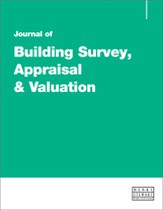The Party Wall Act and boundary disputes: An uneasy and often costly co-existence
Abstract
Every day, up and down the country there are a large number of party wall cases that require resolving. There are, however, a few cases among them that, due to historical disagreements between neighbours, mean that the adjoining owners may not want party wall works to proceed. Boundary dispute claims often prevent such developments from taking place in the first place. If, prima facie, such instances are treated with some credence, with injunctive actions to follow, the county courts are inundated with such cases and may not be able to deal with them swiftly. In boundary disputes, building owners may be faced with long delays, However, in the event of adjoining owners wishing to sell their properties in future, obligation for disclosure of boundary disputes would. It is essential that when boundary disputes are made, the disputes are considered alongside the party wall process and ideally outside the ambit of the courts, perhaps through expert mediation to evaluate the validity of the allegations made and rectify the misunderstandings. This paper analyses a boundary dispute in which no amount of diplomacy could deter a disgruntled adjoining owner from stopping the building process by declaring that administration of the party wall process was null and void until the disputed boundary matter has first been resolved.
The full article is available to subscribers to the journal.
Author's Biography
Peyman Ghasemi is the principal of P G Construction Consultants Ltd (PGCCL) and a Construction Consultant with over 28 years' experience in design, survey and construction management of a wide variety of projects (including residential, commercial and industrial projects). Peyman has worked for and represented a wide variety of clients, ranging from domestic owners to large national companies. His academic qualifications include a master of science in construction engineering and a diploma in construction management. Peyman has been dealing with neighbourly issues for over 16 years and has dealt with a range of complex projects involving party wall disputes, boundary disputes, licensing issues, etc. Peyman is also a certified commercial mediator as well as an expert determinator, dealing amongst others, with construction and property disputes.
Citation
Ghasemi, Peyman (2015, October 1). The Party Wall Act and boundary disputes: An uneasy and often costly co-existence. In the Journal of Building Survey, Appraisal & Valuation, Volume 4, Issue 2. https://doi.org/10.69554/ZBKB1298.Publications LLP
